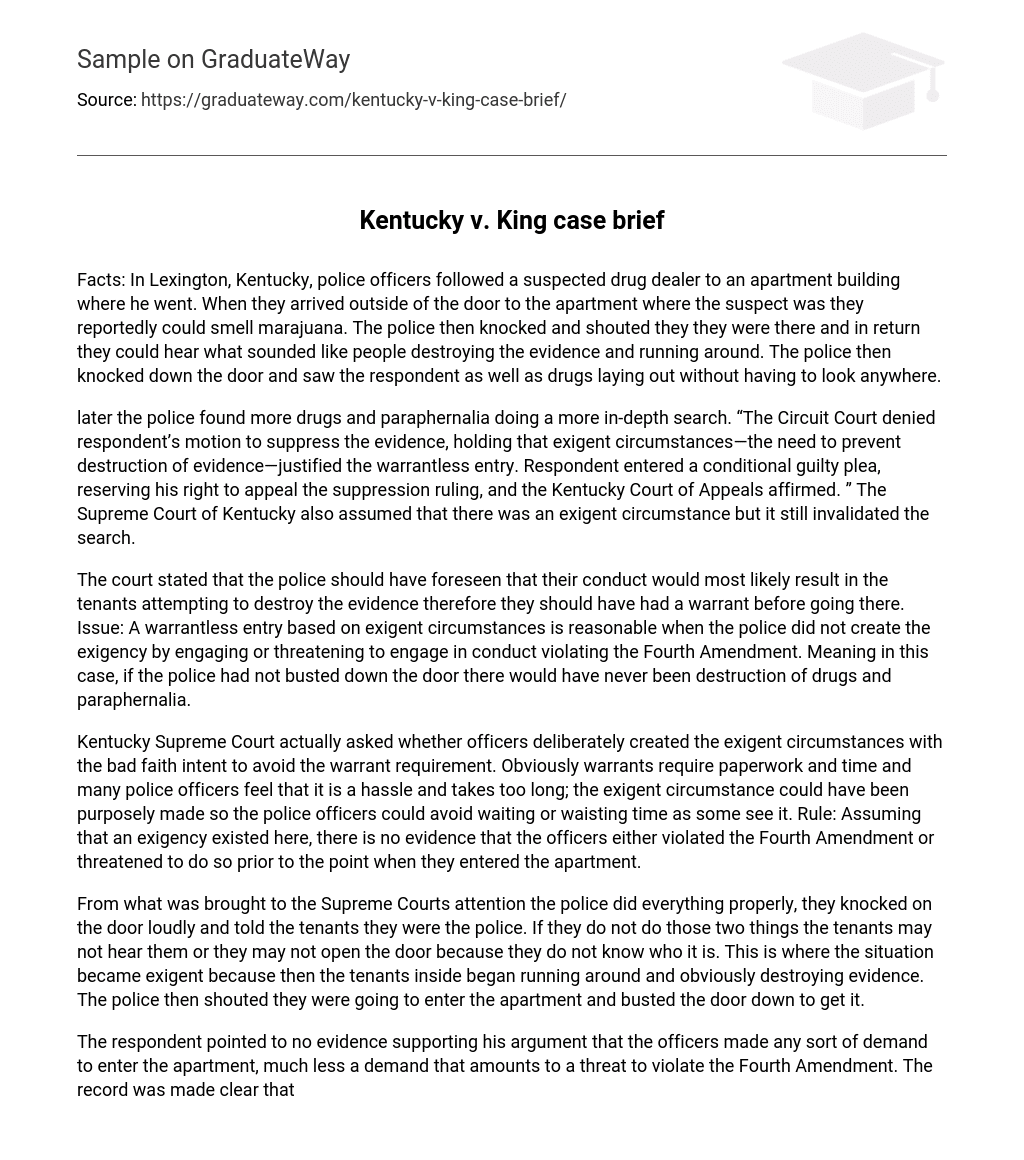Facts: During an investigation in Lexington, Kentucky, law enforcement followed a suspected drug dealer to an apartment building. Upon entering the building, they detected the odor of marijuana coming from a specific apartment. The police proceeded to knock on the door and identify themselves. This action prompted sounds that indicated individuals attempting to destroy evidence and flee. Consequently, the officers entered forcefully through the door and observed both the suspect and drugs in plain sight without further search.
After conducting a more thorough search, the police found more drugs and related items. The Circuit Court denied the respondent’s request to exclude this evidence because they believed there was an urgent need to prevent the destruction of evidence, justifying their entry without a warrant. The respondent pleaded guilty conditionally while reserving the right to appeal against excluding the evidence. The Kentucky Court of Appeals upheld this decision, and although the Supreme Court of Kentucky acknowledged exigent circumstances, they still considered the search invalid.
The court determined that the police should have foreseen that their actions would probably prompt the tenants to attempt to destroy evidence, thus necessitating a warrant prior to entering the premises. The crux of the matter is whether an entry without a warrant can be considered reasonable in urgent situations when the police did not incite or indicate intent to violate the Fourth Amendment. In simpler terms, if the police had not forcefully entered by breaking down the door, there would have been no opportunity for drugs and drug-related items to be eradicated.
The Kentucky Supreme Court has questioned whether officers intentionally manufactured urgent circumstances in order to avoid obtaining a warrant. It is clear that warrants require paperwork and time, which can be tedious and time-consuming for many police officers. Some officers may have deliberately generated exigent circumstances as a means of bypassing the need to wait or waste time, as they perceive it. According to the rule, if there was indeed an emergency in this instance, there is no indication that the officers violated the Fourth Amendment or expressed their intention to do so prior to entering the apartment.
During the Supreme Court proceedings, it was stated that the police adhered to correct protocols by audibly knocking on the door and clearly identifying themselves as law enforcement officers. It is imperative for the occupants to hear the police and be aware of their identity to facilitate opening the door. Nevertheless, urgency arose when those inside became agitated and began destroying evidence. Consequently, in order to gain entry forcefully, the police declared their intention to break down the door.
The respondent did not provide any evidence to support his claim that the officers made an unconstitutional request to enter the apartment. The record clearly showed that the officers expressed their intention to enter the apartment after a pressing situation arose, which justified their actions. This case created controversy as the police officers entered the apartment without a warrant.
The lack of witnesses or evidence posed a significant challenge in reaching a verdict for this case. The police officers contended that exigent circumstances existed prior to entering the apartment, whereas the tenants argued that these circumstances only materialized after their entry. Regrettably, both assertions could hold validity since the incidents took place at separate times. It is crucial to acknowledge that the police officers acted properly and did not attempt to circumvent obtaining search warrants.
The police arrived at the door after detecting the scent of marijuana and found that the tenants were hastily destroying evidence. Ultimately, the tenants were determined to do whatever it took to evade capture. Despite engaging in unlawful behavior, they felt their privacy was violated as their activities occurred indoors and within their own residence.
Even in the confines of one’s home, with a secured door, law enforcement retains the authority to enter if they perceive an escalating emergency. It is not considered a violation of the Fourth Amendment to decline opening the door. In Kentucky v. King (302 S.W. 3d 649) case, it was established that the occupants were accountable for this circumstance. However, in 2011 (No. 09-1272), the Supreme Court reversed and remanded this ruling.





